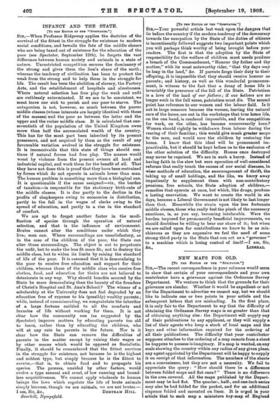[To THE EDITOR OP THE "SPECTATOR:] SIR,—Your powerful article last
week upon the dangers that lie before the country if the modern tendency of the democracy towards the usurpation by the State of the duties of citizens is incontinently followed suggests two important points which you will perhaps think worthy of being brought before your readers. The first is that the adoption by the State of responsibility for the welfare of children must needs produce a breach of the Commandment, "Honour thy father• and thy mother," with its most noteworthy rider, "that thy days may be long in the land," &c. If parents forgo their duty to their offspring, it is impossible that they should receive honour as parents ; and history, as well as this wonderful pronounce- ment, is witness to the fact that a decay of home life is invariably the precursor of the full of the State. Patriotism is a love of the land of our fathers ; if our frathers are no longer such in the full sense, patriotism must die. The second point has reference to our women and the labour field. Is it not in large measure because the women, leaving the natural care of the home, are out in the workshops that true home life, on the one hand, is rendered impossible, and the competition for work, on the other, has become unnecessarily keen ? Women should rightly be withdrawn from labour during the rearing of their families ; this would give much greater scope to the men, and would save the children by restoring the home. I know that this ideal will be pronounced im- practicable, but it should be kept before us to the exclusion of the other solution of the difficulty. Homes once destroyed may never be regained. We are in such a hurry. Instead of having faith in the slow but sure operation of well-considered reforms that really touch the causes of our social diseases, in wiser methods of education, the encouragement of thrift, the taking up of small holdings, and the like, we hurry away impatiently to supplement them with non-contributory pensions, free schools, the State adoption of children,— remedies that operate at once, but which, like drugs, produce a lasting enervation. We want to create the world in six days, because a Liberal Government is not likely to last longer than that. Meanwhile the strain upon the less fortunate middle classes, those who really feel the pinch of the necessary exactions, is, as you say, becoming intolerable. Were the burden imposed for permanently beneficial improvements, we should doubtless be willing to bear our share of it; but when we are called upon for contributions we know to be as mis- chievous as they are expensive we feel the need of some strong third party in the State that can act as a " governor " to a machine which is losing control of itself.—I am, Sir,










































 Previous page
Previous page